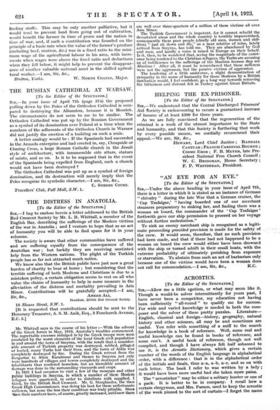THE DISTRESS IN ANATOLIA.
[To the Editor of the SPECTATOR.] Sur,—I beg to enclose herein a letter addressed to the British Red Crescent Society by Mr. L. R. Whittall, a member of the English Bar, describing the sufferings of the Moslem victims of the war in Anatolia ; and I venture to hope that as an act of humanity you will be able to find space for it in your eolunms.
The society is aware that other communities have suffered and are suffering equally from the consequences of the Anatolian war ; but luckily they are receiving unstinted help from the Western nations. The plight of the Turkish people has so far not attracted much notice.
We know also that the British public have just now a great burden of charity to bear at home ; but considering that the terrible suffering of both Moslems and Christians is due to a mistaken policy, a certain obligation seems to rest on all who value the claims of humanity to help in some measure in the alleviation of the distress and mortality prevailing in Asia Minor. Contributions will be gratefully accepted.—I am,
President, British Red Crescent Society.
18 Sloane Street, S.W .1.
[It is requested that contributions should be sent to the Honorary Treasurer, A. S. M. Anik, Esq., 2 Fenchurch Avenue, B.C. 3.]
Mr. Whittall says in the course of his letter :—With the advent of the Greek forces in May, 1919, Anatolia's troubles commenced. The regrettable excesses indulged in by the Greek troops were soon emulated by the worst elements of the local Greek civil population in and around the town of Smyrna, with the result that a consider- able amount of Turkish property was destroyed, robbed, pillaged or looted, many Turks lost their lives, and the town of Aidin was completely destroyed by fire. During the Greek retreat from the Zangarius to Afiun Karahissar and thence to Smyrna not only were hundreds of villages and towns completely destroyed and the inhabitants thus rendered homeless, but an incredible amount of damage was done to the surrounding vineyards and crops. In 1921 I had occasion to visit a few of the mosques and other public buildings in Smyrna, in which a number of these Moslem refugees were quartered, in order to distribute milk supplied, I think, by the British Red Crescent. Mr. G. Sterghiades, the then Greek High Commissioner, was doing his best for these unfortunate sufferers, but none the less their condition was truly pitiable. Since then their numbers have, of course, greatly increased, until now there
are well over three-quarters of a million of these victims all over Asia Minor.
The Turkish Government is impotent, for it cannot rebuild the devastated areas and the whole country is terribly impoverished, consequently these poor people (chiefly old men, women and chil- dren) " just sit down and die," as a near relative of mine, lately arrived from Smyrna, has told me. They are abandoned by Cod and man, and hardly a voice is raised in Europe on their behalf. Is it, then, to be wondered that, seeing the magnitude of the assist- ance being tendered to the Christian refugees, the Turki are accusing us of indifference to the sufferings of the Muslims because they are Muslims ? After all, it must be remembered that these sufferers were not the aggressors, but the passive victims of aggression.
The tendering of a little assistance, a slight demonstration of sympathy in the name of humanity for those Moslems by a British institution would, I feel confident, go a long way towards removing the bitterness and distrust felt in Turkey against Great Britain.










































 Previous page
Previous page